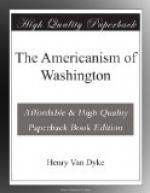“Professedly prudent” is the phrase that I have chosen to apply to Benjamin Franklin. For the one thing that is clear, as we turn to look at him and the other men who stood with Washington, is that, whatever their philosophical professions may have been, they were not controlled by prudence. They were really imprudent, and at heart willing to take all risks of poverty and death in a struggle whose cause was just though its issue was dubious. If it be rashness to commit honor and life and property to a great adventure for the general good, then these men were rash to the verge of recklessness. They refused no peril, they withheld no sacrifice, in the following of their ideal.
I hear John Dickinson saying: “It is not our duty to leave wealth to our children, but it is our duty to leave liberty to them. We have counted the cost of this contest, and we find nothing so dreadful as voluntary slavery.” I see Samuel Adams, impoverished, living upon a pittance, hardly able to provide a decent coat for his back, rejecting with scorn the offer of a profitable office, wealth, a title even, to win him from his allegiance to the cause of America. I see Robert Morris, the wealthy merchant, opening his purse and pledging his credit to support the Revolution, and later devoting all his fortune and his energy to restore and establish the financial honor of the Republic, with the memorable words, “The United States may command all that I have, except my integrity.” I hear the proud John Adams saying to his wife, “I have accepted a seat in the House of Representatives, and thereby have consented to my own ruin, to your ruin, and the ruin of our children”; and I hear her reply, with the tears running down her face, “Well, I am willing in this cause to run all risks with you, and be ruined with you, if you are ruined,” I see Benjamin Franklin, in the Congress of 1776, already past his seventieth year, prosperous, famous, by far the most celebrated man in America, accepting without demur the difficult and dangerous mission to France, and whispering to his friend, Dr. Rush, “I am old and good for nothing, but as the store-keepers say of their remnants of cloth, ’I am but a fag-end, and you may have me for what you please.’”
Here is a man who will illustrate and prove, perhaps better than any other of those who stood with Washington, the point at which I am aiming. There was none of the glamour of romance about old Ben Franklin. He was shrewd, canny, humorous. The chivalric Southerners disliked his philosophy, and the solemn New-Englanders mistrusted his jokes. He made no extravagant claims for his own motives, and some of his ways were not distinctly ideal. He was full of prudential proverbs, and claimed to be a follower of the theory of enlightened self-interest. But there was not a faculty of his wise old head which he did not put at the service of his country, nor was there a pulse of his slow and steady heart which did not beat loyal to the cause of freedom.




